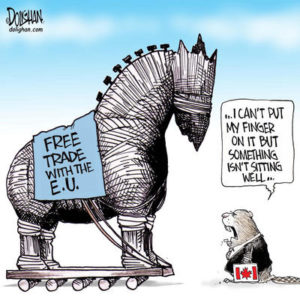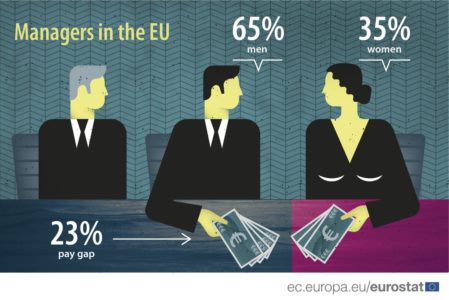Odd Woman Out?
Trade Deals Disproportionately Affecting Women
It has be en well-documented over the past decade through impact on labour market, consumption, and public service provisions; trade is not gender neutral. Without specific binding regulations built into agreements and adequate supervision, women are easily shortchanged by the trade deals. The types of trade agreements the EU is negotiating today (CETA, TTIP, etc) go beyond traditional trade liberalization. They extend into the liberalization of services and regulations, which tend to affect women more significantly. So, what is the EU doing about it?
en well-documented over the past decade through impact on labour market, consumption, and public service provisions; trade is not gender neutral. Without specific binding regulations built into agreements and adequate supervision, women are easily shortchanged by the trade deals. The types of trade agreements the EU is negotiating today (CETA, TTIP, etc) go beyond traditional trade liberalization. They extend into the liberalization of services and regulations, which tend to affect women more significantly. So, what is the EU doing about it?
In a joint-committee meeting between the Committee on International Trade (INTA) and the Committee on Women’s Rights and Gender Equality (FEMM) a working document is being finalized with the goal of ensuring gender equality objectives are being considered in tandem with this new wave of trade agreements. This may seem odd or unnecessary by the standards of many. After all, what do trade agreements really have to do with gender rights? Similarly, why would a progressive bloc of countries like the EU even need a document to ensure this?
FEMM cites in their working paper the urgent need for the EU to include clauses on gender equality. This can be included into deals either as separate chapters or as clauses built into all the other chapters. The TFEU enshrines gender equality as a priority of the EU. Research points towards trade liberalization, specifically service liberalization, widening the pay gap between men and women in Asia. It seems hypocritical to claim the EU can be both pursuing a feminist goals all the while disadvantaging women worldwide.

The working document provides a plethora of possible options and tools for the EU to better include goals of gender equality in trade deals. I would argue that aside from these pragmatic conclusions, it might be equally useful to work towards normalizing gendered conditions of trade in the common dialogue that happens during negotiations. We already normalized considering how specific labour sectors will be affected; so why not for gender? This process of “gender-mainstreaming” has been promoted by the EU previously and should be used in tandem with the formidable practical list of tools suggested by the FEMM & INTA Committees.
A shift in understanding of the importance of gendered considerations in trade agreements does seem to be on the horizons. Aside from the working paper noted above, the Committee for Foreign Affairs (AFET) voted yesterday to include a FEMM opinion in their position on relations with India. The opinion insists on the incorporation of gender equality protections in all of their future agreements with India. This is a positive step towards recognizing the underlying role that gender plays in both foreign affairs and trade relations. Recognizing this can help the EU avoid inadvertently worsening gender gaps, both abroad and within their own borders. The only way the EU can effectively “walk the walk” to the gender equality talk that they promote is by beginning to include gendered considerations in all aspects.
This new wave of novel trade negotiations will only continue as CETA is finalized, TTIP may one day be revitalized, and Brexit will eventually need to negotiate a trade agreement of some sort. It is more important now than ever to create a progressive and egalitarian foundation. The EU must set certain standards of how they will negotiate these deals without undermining goals of gender equality. I commend the various committees for their efforts in defending this position. Here’s to hoping for a bright and prosperous future for all.
